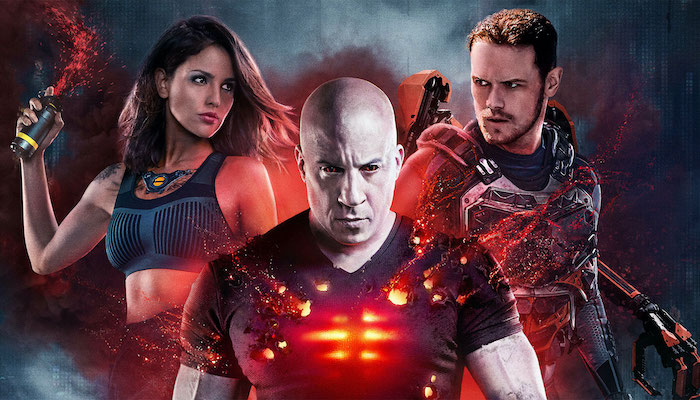Bloodshot (2020) – A High-Octane Sci-Fi Action Thriller

Bloodshot (2020) – A High-Octane Sci-Fi Action Thriller
Bloodshot (2020), directed by Dave Wilson in his feature film debut, is an adrenaline-charged sci-fi action thriller that explodes onto the screen with relentless energy and futuristic flair. Adapted from the Valiant Comics character created by Kevin VanHook, Don Perlin, and Bob Layton, this film delivers a visceral punch of high-stakes action, cutting-edge technology, and a gripping tale of revenge and identity. Anchored by Vin Diesel’s commanding presence as Ray Garrison—a soldier reborn as a superhuman weapon—Bloodshot hit theaters on March 5, 2020, offering audiences a wild ride through a world where the line between man and machine blurs into a haze of bullets, blood, and nanobots. It’s a futuristic saga that doesn’t just entertain—it challenges you to question what it means to be human in an age of engineered perfection.
The Setup: Death, Resurrection, and Revenge
The story kicks off with Ray Garrison, a battle-hardened U.S. Marine portrayed by Diesel with his trademark blend of grit and gravitas. Ray’s a soldier’s soldier—tough, loyal, and fiercely devoted to his wife, Gina (Talulah Riley), whose warm presence lights up his world. Their idyllic life shatters in a brutal instant when a psychopathic criminal, Martin Axe (Toby Kebbell), executes them both in a cold-blooded ambush. It’s a gut-wrenching opening that sets the stakes high: Ray’s not just a man with a mission—he’s a man torn from everything he loved.
But death isn’t the end for Ray—it’s the beginning. Enter Rising Spirit Technologies (RST), a shadowy corporation led by the brilliant but morally dubious Dr. Emil Harting (Guy Pearce). Using groundbreaking nanotechnology, RST resurrects Ray, pumping his veins with microscopic machines that rebuild his body from the inside out. These nanobots grant him superhuman strength, lightning-fast reflexes, and a healing factor that makes Wolverine look slow—gunshots close up in seconds, broken bones snap back into place, and even a shattered skull reforms like clay under a sculptor’s hands. Ray’s no longer just a soldier; he’s Bloodshot, an indestructible weapon forged for a secret military agenda. The catch? His memories are fragmented, his past a jigsaw puzzle manipulated by RST to keep him on their leash.
The plot ignites as Ray is sent on missions to eliminate targets—each one framed as the man who killed Gina. Armed with his new abilities, he tears through enemies with the ferocity of a one-man army, Diesel’s hulking frame smashing through walls and foes alike. But the cracks start to show. Flashbacks pierce the fog of his mind, and Ray begins to suspect the truth: his resurrection wasn’t a gift—it’s a lie. The man he’s hunting isn’t real; his memories are implants, rewritten by Harting to turn him into a programmable killer. Fueled by rage and betrayal, Ray breaks free, setting out to uncover the conspiracy behind his death and exact revenge on those who stole his life. It’s a classic revenge tale with a sci-fi twist, propelled by the question: is he still Ray Garrison, or just a machine wearing his face?
Characters: Depth Amid the Chaos
Vin Diesel anchors Bloodshot as Ray, bringing a mix of raw physicality and surprising emotional depth to the role. Known for his gravelly voice and action-hero swagger, Diesel digs deeper here, capturing Ray’s torment as a man caught between his human soul and his engineered body. His thirst for justice burns through every frame—whether he’s pummeling henchmen or staring into the void of his lost past, Diesel sells the pain of a soldier stripped of everything but his will to fight. The quiet moments, like when Ray clutches at fleeting memories of Gina, hit hard, grounding the film’s bombast in something real.

The supporting cast shines too. Eiza González plays KT, a former soldier enhanced with cybernetic lungs, who becomes Ray’s ally and moral compass. González infuses KT with toughness and heart, her chemistry with Diesel sparking a bond that feels earned amid the chaos. Guy Pearce’s Dr. Harting is the film’s slick villain—a scientist whose cool intellect masks a ruthless ambition. Pearce plays him with a calculated chill, making Harting less a cartoonish bad guy and more a believable manipulator who sees Ray as a means to an end. Lamorne Morris adds levity as Wilfred Wigans, a quirky hacker who aids Ray, while Sam Heughan’s Dalton, a cybernetically enhanced enforcer, brings a menacing edge to the action. Together, they form a dynamic ensemble that keeps the film’s pulse racing.
Action and Effects: A Visual Assault
Director Dave Wilson, a visual effects veteran from Blur Studio, unleashes a barrage of high-octane action that’s as stylish as it is brutal. The film’s pacing is relentless—think car chases that spill into gunfights, fistfights that escalate into explosions, and showdowns that feel like a video game boss battle on steroids. One standout sequence sees Ray ambushed in a tunnel, his nanobots stitching him back together mid-fight as bullets fly and concrete crumbles. Another pits him against Dalton in a flour-dusted warehouse, the white clouds turning every punch and kick into a slow-motion ballet of destruction. Wilson’s knack for kinetic editing keeps you glued to the screen, each cut amplifying the stakes.
The CGI is a star in its own right, especially the nanobots. These microscopic marvels swarm through Ray’s body in vivid detail—red tendrils racing to mend a gaping wound, glowing circuits pulsing under his skin. It’s a visual feast that blends seamlessly with practical effects, like Diesel’s real-time stunts, to create a believable sci-fi spectacle. The tech isn’t just eye candy—it’s a plot driver, raising the stakes as Ray pushes his limits and RST scrambles to control him. The film’s $45 million budget—modest by blockbuster standards—stretches impressively, delivering a polished look that rivals bigger Marvel fare.
Themes: Man vs. Machine
Beneath the explosions, Bloodshot wrestles with big questions: What makes us human? Can memory define identity, or is it just code to be rewritten? Ray’s journey is as much about self-discovery as it is about revenge. He’s a man reborn as a weapon, torn between his fading humanity and the cold efficiency of his nanobot-driven existence. The film doesn’t shy away from the moral gray—Harting’s vision of progress clashes with Ray’s fight for autonomy, while KT’s own enhancements highlight the cost of trading flesh for tech. It’s not a philosophical treatise, but it adds a layer of depth that elevates Bloodshot beyond mindless action.
A Valiant Start in a Crowded Genre
Bloodshot aimed to kick off a Valiant Comics cinematic universe, a bold move in a landscape dominated by Marvel and DC. Its comic roots shine through—Ray’s arc echoes the source material’s blend of grit and high-tech heroism—but the film stands alone, accessible to newcomers. Released just before the COVID-19 pandemic shuttered theaters, it grossed $37 million worldwide against a tight budget, finding a second life on streaming platforms like Netflix. Critics were mixed—some praised its action and Diesel’s star power, others knocked its familiar beats—but fans of sci-fi thrillers embraced its unapologetic energy.
Behind the Scenes: A Rookie’s Triumph
Dave Wilson’s transition from VFX to directing is a success story in itself. Mentored by Tim Miller (Deadpool), Wilson brought a fresh eye to the genre, balancing spectacle with character. The script, penned by Jeff Wadlow and Eric Heisserer, leans on action-movie tropes but spices them with clever twists—like Ray’s memory manipulation—that keep you guessing. Producers Neal H. Moritz and Dinesh Shamdasani kept the Valiant spirit alive, ensuring Bloodshot honored its roots while aiming for mass appeal.
Why It Works
Bloodshot thrives on its high-stakes thrills and Diesel’s magnetic lead. It’s not reinventing the wheel—echoes of RoboCop, The Terminator, and Universal Soldier linger—but it carves its own niche with nanobot-fueled flair. The action never lets up, the effects dazzle, and the emotional core lands just enough punches to matter. It’s a film that knows its lane—pure, unfiltered sci-fi action—and races down it at full speed.
Final Verdict: A Must-Watch for Genre Fans
Bloodshot (2020) is a high-octane cocktail of sci-fi, action, and personal redemption. With Vin Diesel’s powerhouse performance, Dave Wilson’s explosive direction, and a story that blends revenge with existential heft, it’s a standout in the genre. Whether you’re here for the nanobot-enhanced brawls, the conspiracy unravels, or Ray’s quest to reclaim his soul, Bloodshot delivers. For fans of fast-paced thrills and futuristic stakes, it’s a cinematic shot of adrenaline you won’t want to miss. Strap in—Ray Garrison’s got a score to settle, and he’s taking you along for the ride.











